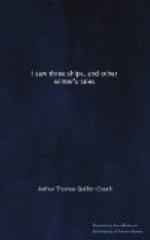“Did ‘ee see that dainty frigate go cruisin’ by, two hour agone?”
“No.”
“Then ye missed a sweet pretty sight. Thirty guns, I do b’lieve, an’ all sail set. I cou’d a’most count her guns, she stood so close.”
“Hey?”
“She tacked just here an’ went round close under Bradden Point; so she’s for Troy, that’s certain. Be you bound that way, too?”
“Iss, I’ll see her, if she’s there.”
“Best not go too close, my son; for I know the looks o’ those customers. By all accounts you’m a man of too much substance to risk yourself near a press-gang.”
Young Zeb gazed over the old man’s head at the horizon line, and answered, as if reading the sentence there, “I might fare worse, hollibubber.”
The hollibubber seemed, for a second, about to speak; for, of course, he knew Zeb’s trouble. But after a while he took his shovel out of the ground slowly.
“Ay, ye might,” he said; “pray the Lord ye don’t.”
Zeb went on, faster than ever. He passed Bradden Point and Widdy Cove at the rate of five miles an hour, or thereabouts, then he turned aside over a stile and crossed a couple of meadows; and after these he was on the high-road, on the very top of the hill overlooking Troy Harbour.
He gazed down. The frigate was there, as the hollibubber had guessed, anchored at the harbour’s mouth. Two men in a small boat were pulling from her to the farther shore. A thin haze of blue smoke lay over the town at his feet, and the noise of mallets in the ship-building yards came across to him through the clear afternoon. Zeb hardly noticed all this, for his mind was busy with a problem. He halted by a milestone on the brow of the hill, to consider.
And then suddenly he sat down on the stone and shivered. The sweat was still trickling down his face and down his back; but it had turned cold as ice. A new idea had taken him, an idea of which at first he felt fairly afraid. He passed a hand over his eyes and looked down again at the frigate. But he stared at her stupidly, and his mind was busy with another picture.
It occurred to him that he must go on if he meant to arrange with Webber, that afternoon. So he got up from the stone and went down the steep hill towards the ferry, stumbling over the rough stones in the road and hardly looking at his steps, but moving now rapidly, now slowly, like a drunken man.
The street that led down to the ferry dated back to an age before carts had superseded pack-horses, and the makers had cut it in stairs and paved it with cobbles. It plunged so steeply, and the houses on either side wedged it in so tightly, that to look down from the top was like peering into a well. A patch of blue water shone at the foot, framing a small dark square—the signboard of the “Four Lords” Inn. Just now there were two or three men gathered under the signboard.
As Young Zeb drew near he saw that they wore pig-tails and round shiny hats: and, as he noticed this, his face, which had been pale for the last five minutes, grew ashen-white. He halted for a moment, and then went on again, meaning to pass the signboard and wait on the quay for the ferry.




